Conscience and Conviction – WWI school resources
2014
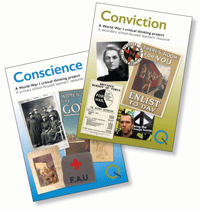 Quaker Peace and Social Witness has produced two new resources for peace education: Conscience (primary school-focused) and Conviction (secondary school-focused).
Conviction can supplement existing lesson materials in subjects such as History, Religious Education or Citizenship, and be used to support the delivery of Personal Social Health Education (PSHE) or Spiritual Moral Social Cultural (SMSC) education.
Through engaging with speaking and listening activities in pairs and groups, children can discuss and reflect on historical source materials including documents, letters, posters and images.
Quaker Peace and Social Witness has produced two new resources for peace education: Conscience (primary school-focused) and Conviction (secondary school-focused).
Conviction can supplement existing lesson materials in subjects such as History, Religious Education or Citizenship, and be used to support the delivery of Personal Social Health Education (PSHE) or Spiritual Moral Social Cultural (SMSC) education.
Through engaging with speaking and listening activities in pairs and groups, children can discuss and reflect on historical source materials including documents, letters, posters and images.
Security for the future: In search of a new vision
May 2016
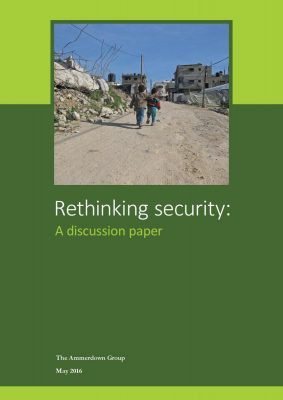 A group of UK peacebuilding professionals invite you to participate in a new civic conversation about alternatives to the current approach to national security. Here they outline their concerns about the existing model, and offer a different vision for the future, welcoming input from anyone who wishes to engage in this debate.
A group of UK peacebuilding professionals invite you to participate in a new civic conversation about alternatives to the current approach to national security. Here they outline their concerns about the existing model, and offer a different vision for the future, welcoming input from anyone who wishes to engage in this debate.
Army Recruitment: Comparative cost-effectiveness of recruiting from age 16 versus age 18
September 2014
 This paper, published by ForcesWatch and Child Soldiers International, shows that the taxpayer would save approximately £50 million per annum if the minimum age of recruitment were raised to 18; it would also result in the army needing to find about 211 fewer new recruits annually, based on current numbers joining the trained strength.
The paper concludes that the case to cease recruiting from age 16 is now overwhelming and urges a full, independent review of the policy, with a view to phasing out the recruitment of minors as an unnecessary, cost-ineffective, and fundamentally unethical practice.
This paper, published by ForcesWatch and Child Soldiers International, shows that the taxpayer would save approximately £50 million per annum if the minimum age of recruitment were raised to 18; it would also result in the army needing to find about 211 fewer new recruits annually, based on current numbers joining the trained strength.
The paper concludes that the case to cease recruiting from age 16 is now overwhelming and urges a full, independent review of the policy, with a view to phasing out the recruitment of minors as an unnecessary, cost-ineffective, and fundamentally unethical practice.
Engage: the Military and Young People
June 2014
A short film made by Headliners and ForcesWatch, 2014
Why does the military have a 'youth engagement' policy and why is the government promoting 'military ethos' within education? What is the impact of military activities taking place in schools? ForcesWatch have been working with the charity Headliners and a group of young people in London to produce this short film which explores these questions and gives teenagers the opportunity to voice their reaction to the military’s interest in their lives.National polls show growing public support from raising UK army recruitment age
October 2014
A nationwide poll conducted in July 2014 by Ipsos MORI on behalf of the Joseph Rowntree Reform Trust Ltd found that 78 per cent of respondents who expressed a view thought the minimum enlistment age for the Army should be 18 or above. Just 14 per cent of respondents thought the minimum age should be 16 (as it currently is) or less.
An identically worded poll conducted in April 2013 by ICM found 70 per cent of respondents who expressed a view thought the minimum enlistment age should be 18 or above, with 20 per cent supporting 16 or younger.
See data from 2018.
Engage: the Military and Young People – discussion points
2014
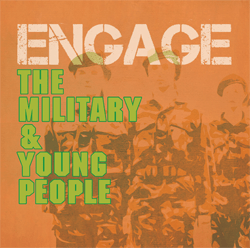 Why does the UK military have a 'youth engagement' policy and why is the UK government promoting 'military ethos' within education? What is the impact of military activities taking place in schools? ForcesWatch and Headliners worked with a group of young people in London to produce this short film which explores these questions. These discussion points can be used in education and youth groups.
Why does the UK military have a 'youth engagement' policy and why is the UK government promoting 'military ethos' within education? What is the impact of military activities taking place in schools? ForcesWatch and Headliners worked with a group of young people in London to produce this short film which explores these questions. These discussion points can be used in education and youth groups.
Gender & Militarism: Analyzing the Links to Strategize for Peace
2014
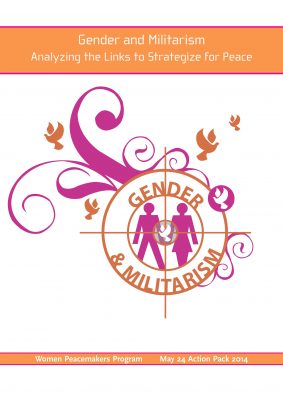 Gender and Militarism: Analyzing the Links to Strategize for Peace, published by the Women Peacemaker Programme in 2014, is a resource with contributions from many individuals and organisations, including some of the foremost researchers in the area.
Gender and Militarism: Analyzing the Links to Strategize for Peace, published by the Women Peacemaker Programme in 2014, is a resource with contributions from many individuals and organisations, including some of the foremost researchers in the area.
How did Britain let 250,000 underage soldiers fight in WW1?
2014
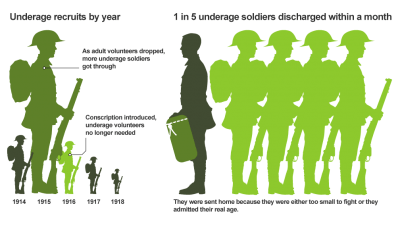 A BBC resource. Includes a final section on 'could this happen today'?
At the outbreak of war in 1914, the British Army had 700,000 available men. Germany’s wartime army was over 3.7 million. When a campaign for volunteers was launched, thousands answered the call to fight. Among them were 250,000 boys and young men under the age of 19, the legal limit for armed service overseas.
A BBC resource. Includes a final section on 'could this happen today'?
At the outbreak of war in 1914, the British Army had 700,000 available men. Germany’s wartime army was over 3.7 million. When a campaign for volunteers was launched, thousands answered the call to fight. Among them were 250,000 boys and young men under the age of 19, the legal limit for armed service overseas.
Peace Education Network
 The Peace Education Network is a national UK network that brings together people and organisations committed to education for peace.
The Peace Education Network is a national UK network that brings together people and organisations committed to education for peace.
Teach Peace pack
revised 2016
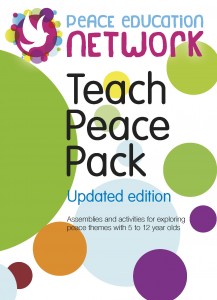 Teach Peace, a new resource from the Peace Education Network, is a set of eight assemblies, follow-up activities, resources, prayers and reflections on peace for primary schools.
From the UN peace day, 21 September, to the International Day for Children as Victims of War, 4 June, the school year is ?lled with opportunities to use the assemblies and activities in Teach Peace. This resource will help to ensure peace is a key theme in our children’s education and help you to celebrate peace and the peacemakers in your school.
The entire resource is free to download below. Hard copies of Teach Peace are available from the Peace Education Network for £5. Also available in Welsh.
Teach Peace, a new resource from the Peace Education Network, is a set of eight assemblies, follow-up activities, resources, prayers and reflections on peace for primary schools.
From the UN peace day, 21 September, to the International Day for Children as Victims of War, 4 June, the school year is ?lled with opportunities to use the assemblies and activities in Teach Peace. This resource will help to ensure peace is a key theme in our children’s education and help you to celebrate peace and the peacemakers in your school.
The entire resource is free to download below. Hard copies of Teach Peace are available from the Peace Education Network for £5. Also available in Welsh.
ForcesWatch submission to Defence Select Committee inquiry on Military Casualties
March 2014
ForcesWatch's submission to the Defence Select Committee inquiry on Military Casualties draws on our research published in The Last Ambush.
Presentations from the Militarisation in Everyday Life in the UK conference
November 2013
Camouflage Kids: How the military affects young people’s lives
November 2013
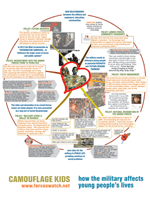 A ForcesWatch poster showing policy, cultural and other recent developments affecting the extent of military influence in young people's lives.
A ForcesWatch poster showing policy, cultural and other recent developments affecting the extent of military influence in young people's lives.
Journeys in the Spirit: Quakers and the military
June 2013
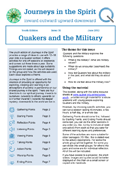 The youth edition of Journeys in the Spirit (number 19) provides a range of ideas to use with 12–18 year olds in a Quaker context.
The youth edition of Journeys in the Spirit (number 19) provides a range of ideas to use with 12–18 year olds in a Quaker context.
The Last Ambush? Aspects of mental health in the British armed forces
October 2013
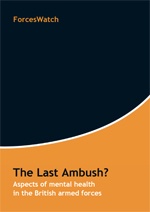 This report from ForcesWatch, shows that young soldiers recruited from disadvantaged backgrounds are substantially more likely than other troops to return from war experiencing problems with their mental health. It calls for the policy of recruiting from age 16 to be reviewed so that the greatest burden of risk is not left to the youngest, most vulnerable recruits to shoulder.
This report from ForcesWatch, shows that young soldiers recruited from disadvantaged backgrounds are substantially more likely than other troops to return from war experiencing problems with their mental health. It calls for the policy of recruiting from age 16 to be reviewed so that the greatest burden of risk is not left to the youngest, most vulnerable recruits to shoulder.
